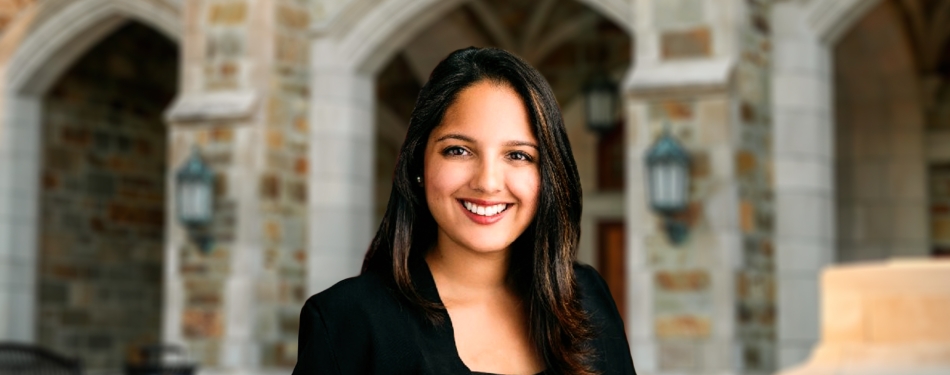As an attorney at Keker, Van Nest & Peters in San Francisco, Deeva Shah, ’17, represents clients in all facets of commercial litigation. While she enjoys working on cutting-edge cases and tackling unique problems that require solutions for her clients, she is also active in advocating for reforms in the federal judiciary.
Shah, who clerked on the US District Court for the Central District of California and on the US Court of Appeals for the Ninth Circuit, co-founded the Law Clerks for Workplace Accountability (LCWA). The organization’s goal is to ensure that the federal judiciary provides a safe workplace environment, free of harassment, for all employees.
Her work with the LCWA might seem different from her work with the firm, but Shah said they have a few things in common. “They are issues of first impression that require creative thinking, a willingness to make tough calls, and a holistic understanding of each client’s concerns and goals throughout the process.”
For her work with the LCWA, she recently received the Jack Berman Award from the New Lawyers Section of the California Lawyers Association, which gives the award each year to one new or young lawyer for service to the legal profession. She discusses her work with the LCWA below.
Why is your work with the LCWA needed?
Employees of the judicial branch (including law clerks, judicial assistants, federal public defenders, pretrial and probation officers, and others) are generally unable to seek redress for harassment or discrimination under well-known laws like Title VII, the Americans with Disability Act, and others. Instead, they are required to follow the judiciary’s Employment Dispute Resolution procedures.
Although these procedures have improved since we started our advocacy work in 2017, employees who go through the process still feel as if they are left without meaningful recourse. These procedures are applied inconsistently and can further exacerbate the suffering of employees who have already experienced harassment, discrimination, or abusive behavior. The redress that is available is severely limited as well.
The goal has been to shine a light on these inequities and ensure that changes are made for current and future employees of the federal judiciary.
How did you initially become involved in this work?
After graduating from Michigan Law, I clerked on the US District Court for the Central District of California. During my clerkship, two colleagues shared that they had experienced sexual harassment on the job. Friends in other courts also talked about the harassment or discrimination they were facing.
Given the formative and enriching experience I was having as a law clerk, I found it unfair that others did not have the same opportunities to learn from their clerkships. I assumed that there would be a simple way for employees to report such misconduct but quickly learned that was not the case, which led to my advocacy work.
How do the power dynamics between judges and clerks discourage reporting of harassment claims?
In 2016, the Equal Employment Opportunity Commission published a report from its Select Task Force on the Study of Harassment in the Workplace, which noted structural factors that can increase the likelihood of harassment. Workplaces with significant power disparities were high on the list of environments where harassment was more likely to occur.
The judiciary has always had a significant power disparity between judges and staff, especially with regard to law clerks. Judges can fire clerks at will, and clerks fear retaliation because losing a clerkship may reflect poorly on their competence and employability, particularly for candidates early in their careers.
Similarly, workplaces where certain employees are seen as more “high value” can encourage misconduct and discourage employees from reporting. Unlike law clerks, who can be fired at will, federal judges can be removed only by impeachment or resignation. And the revelations regarding judicial misconduct starting in 2017 have shown how some judges may believe that general rules of most workplaces don’t apply to them. Law clerks who face misconduct are thus more likely to believe that reporting will be ineffective.
Finally, given the level of control judges may have over their chambers, working as a law clerk can be isolating in a workplace where misconduct can go unchecked. The federal judiciary is quite decentralized, and judges are disincentivized from acting as a check on each other. The general attitude is that one judge will not interfere with another judge’s chambers. Thus, misconduct is even more likely to go unchecked.
What solutions do you recommend to these problems?
There is no one solution that will fix these problems; in the long term, only cultural change will truly address and curb misconduct. Nevertheless, the reporting systems can always be better. Although the judiciary has taken significant strides in addressing issues of harassment and discrimination in the workplace, many challenges still remain.
The amicus brief I co-drafted with colleagues at Keker, Van Nest & Peters highlights four flaws with the current reporting procedures and protections:
- The processes are still opaque.
- The lack of meaningful confidentiality heightens the risk of retaliation.
- The procedures lack—or at least appear to lack—impartiality.
- The remedies are limited. Fixing those flaws in the procedures themselves will help encourage reporting and curb misconduct.
Finally, the Judiciary Accountability Act is making its way through the US Congress. It would expand workplace protections for judicial branch employees; would prohibit discrimination based on race, color, religion, sex, national origin, age, or disability; and would prohibit retaliation against whistleblowers.
Although many of these issues may continue without cultural change, legislative change is another avenue to begin solving these problems.
What can law schools do to help find solutions?
On an individual level, law schools can ensure that their current and former students have access to resources. When law clerks face misconduct, it can often be quite difficult to know where to turn for advice and help. Many law clerks tend to be recent law school graduates and turn to their law schools and law professors for advice. Law schools can provide students with information about reporting procedures and connect students to counsel.
On a broader level (and as Professor Leah Litman and I explained in our essay in the Northwestern University Law Review), law schools are the primary place where we can shift the norms about how we talk about judges and clerkships. Acknowledging that the federal judiciary is still a workplace, and that judges can create and face the same problems as other employers, can help foster more conversations about these issues and create support for those who are experiencing or have experienced misconduct.







